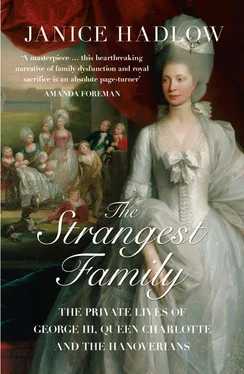For others, it was her calm good temper that attracted most plaudits. Munchausen, to whom more than anyone she owed her good fortune, was struck by the sweetness of her disposition, if not the polish and sparkle of her conversation. ‘It cannot be pretended she should entertain people in a brilliant manner,’ he observed, ‘but she is gracious and kind to everyone.’ He noticed that her servants and entourage adored her and that ‘never since her tenderest childhood did she arouse in anyone the slightest ill humour’. 31Charlotte’s marriage prospects had plucked her from obscurity and made her an object of political interest to other European states. Baron Wrangel, a Swedish diplomat reporting on her to his government, painted a similar picture of placid good temper and innocence. ‘She has a good and generous heart … but no idea of the value of money.’ She spent a lot of her time with servants, and was unguarded in her conversations with them, a fact that might, he thought, be used to gather intelligence about her; but she was not herself either a strategist or schemer. ‘She has no knowledge of politics, and no idea of intrigues, or of the interests of princes.’ That, he believed, was one of the reasons she had been chosen, since ‘she will never involve Britain in the affairs of the Continent’. 32To some extent, Wrangel was correct in his analysis. The relative insignificance of Mecklenburg meant that in marrying one of its princesses, George was unlikely to become embroiled in the complicated pattern of alliance and dispute that dominated relationships between the larger and more powerful German princely states.
But it was Charlotte’s character as much as her dynastic neutrality that consolidated her appeal for the king. It was her simplicity, upon which all who met her commented with such approval, her lack of sophistication, of contention or wilfulness, that commended her most strongly to Graeme and, through his reports, to her future husband. Young, inexperienced, untutored in the ways of courts or politics, her naivety emerged not as the disadvantage Munchausen had feared, but as her most powerfully attractive quality, an enticingly blank page for a man to write upon. She was ‘mild’, ‘soft and pliable’, Graeme enthused, ‘capable of taking any impression, of being moulded into any form’. 33Little similar flexibility was to be expected from her husband, who saw himself as the secure stake around which his wife would twine. George would supply the worldly judgement and direction their relationship would require; he did not hope or wish to find such qualities in his wife. Charlotte’s lack of looks, money, sophistication and influence counted for nothing; on the contrary, they amplified the key promise of her pliability – and it was that which ultimately secured her the crown.
‘The more I resolve in my mind the affair, the more I wish to have it immediately concluded,’ wrote George to Bute at the end of June. Now he had made his choice, he was impatient to be married; but he was also keen to spare his bride the prospect of having to face both coronation and wedding services in intimidating succession. The coronation was planned for September. He hoped Charlotte could arrive in London a month beforehand, allowing time for the wedding and a short honeymoon. With no time to lose, the machinery of government and protocol was put in motion, and the Privy Council was summoned to meet on 8 July. When they assembled, they were informed of the king’s intention ‘to demand in marriage the Princess of Mecklenburg-Strelitz, a princess distinguished by every eminent virtue and amiable endowment’. This was the meeting that so shocked Henry Fox and put an abrupt end to Sarah Lennox’s royal romance. It caught even the unflappable Walpole by surprise, and as a result he had only the baldest news about the impending nuptials to pass on to his extensive network of correspondents. ‘All I can tell you of truth is that Lord Harcourt goes to fetch the princess and comes back as her Master of the Horse. She is to be here in August, and the coronation on the 22nd September.’ 34
The choice of Lord Harcourt as the official charged with negotiating the marriage treaty, and bringing Charlotte to her new home in England, was surprising – Harcourt himself confessed that ‘this office I expected about as much as I did the Bishopric of London, then vacant’. His last contact with the king had been as his louche and ineffectual governor, when George was Prince of Wales. It was Harcourt who had so successfully and infuriatingly given the dowager princess the repeated brush-off, despite all her persistent attempts to pin him down and find out exactly what he was doing with her son. It was a mystery to everyone why George had chosen him, but somehow fitting that the appointment seems to have arisen from what Harcourt had not done rather than as the result of some more positive action. The king was said to have told Harcourt that as he was the only man not to have solicited him for a place when he inherited the throne, he had always had it in mind to do something for him. It was definitely a plum of a job; Harcourt was given the title Master of the Horse to the new queen’s household, and was granted the huge sum of £4,000 to pay for his trip.
He arrived in Strelitz on 14 July. The next day, final details were agreed and the marriage treaty was ‘despatched away to England’. Harcourt was pleased to see how hard the ducal family had exerted themselves to mark the occasion and was particularly impressed by a grand banquet, held the night the treaty was signed. The palace and gardens were lit with 40,000 lamps; even the small town of Neustrelitz illuminated its lanes and backstreets to celebrate. To conclude the event, Charlotte made a speech of thanks which ended with a formal leave-taking of her family. It ‘so forcibly impressed many of the bystanders that their wet cheeks could only tell what they felt’. Colonel Graeme – who was among the damp-eyed spectators – was moved to uncharacteristic emotion, writing to Bute that he was convinced ‘no marriage can afford a greater prospect of happiness’. 35When the day came to leave, Charlotte departed in great style. Lord Harcourt’s carriage led the way, followed by Charlotte’s; in the third carriage came ‘the ladies’, including two ‘ femmes des chambres ’, Juliana Schwellenberg and Johanna Hagerdorn. George had been reluctant to allow Charlotte to bring any of her old servants with her to England. ‘I own I hope they will be quiet people,’ he told Bute gloomily, ‘for by my own experience I have seen these women meddle much more than they ought to do.’ 36
Back in London, the king’s enthusiasm mounted daily. He had acquired a portrait of Charlotte and was said to be ‘mighty fond of it, but won’t let any mortal look at it’. 37Although George had little interest in fashion, he concerned himself in the provision of a suitable wardrobe for his bride. ‘Graeme ought to get a very exact measure of her,’ he told Bute, ‘accompanied with a very explicit account of every particular, that her clothes may be made here.’ 38He knew that the styles of a remote German court would not survive the critical scrutiny of the London beau monde. The usual method of ordering clothes by proxy was to send one’s stays to the dressmaker, who would use them as a form of measurement, but such was the austerity of Charlotte’s upbringing that she had only a single pair, which clearly could not be spared. Graeme sent her measurements instead, passing them on to Lady Bute, who was to ensure that new gowns – and presumably a few extra pairs of stays – would be waiting for Charlotte when she arrived in England.
The atmosphere of apprehension and excitement in London had reached fever pitch well before Charlotte had even set out from Mecklenburg. The announcement of the royal wedding had been followed by news of a great victory in India, where the British and French were contesting for supremacy in the subcontinent. The capture of Pondicherry, the principal French base in the south, marked a decisive upturn in British fortunes, and had inflamed the national mood of manic self-congratulation even further. Even the usually detached Walpole was caught up in the celebratory atmosphere. ‘I don’t know where I am,’ he confessed. ‘It is all royal marriages, coronations and victories; they come tumbling so over one another from distant parts of the globe that it looks just like the handiwork of a lady romance writer to whom it costs nothing but a little false geography to make the Great Mogul fall in love with a Princess of Mecklenburg and defeat two marshals of France as he rides post on an elephant to his nuptials.’ 39
Читать дальше












